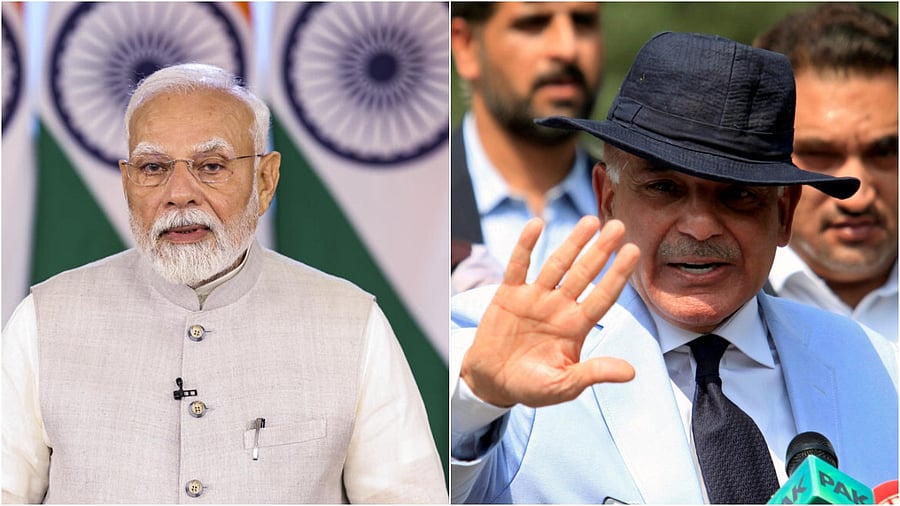
Indian Prime Minister Narendra Modi (L); Pakistan Prime Minister Shahbaz Sharif.
Credit: PTI, Reuter Photos
New Delhi: Russia has joined the United States in nudging India to restart dialogue with Pakistan, even as a four-day-long cross-border flare-up earlier this month put the two South Asian nations on the brink of war.
Not only Moscow and Washington DC, but Beijing too recently expressed hope that India and Pakistan would build on the momentum of the May 10 understanding to halt cross-border military actions and “avoid the recurrence of conflict, properly handle differences through dialogue and negotiation, and return to the track of political settlement”.
Moscow consistently advocates the resumption of dialogue and an increase in the level of mutual trust between India and Pakistan, Maria Zakharova, the spokesperson of the Ministry of Foreign Affairs of the Russian Federation, told journalists. She was responding to a question on Russia’s position on the understanding India and Pakistan reached on May 10 to stop the cross-border military offensives and counter-offensives.
The US has also been calling for “direct talks” between India and Pakistan. “What we are happy to see is a ceasefire, and that’s where our focus remains. We want to see direct talks (between New Delhi and Islamabad),” Tommy Pigott, the principal deputy spokesperson of the US State Department, said in Washington, D.C. He referred to President Donald Trump’s words of applause for Prime Minister Narendra Modi of India and Prime Minister Shehbaz Sharif of Pakistan “for choosing the path of peace”.
Trump has been repeatedly claiming over the past few days that his administration brokered the ‘ceasefire’ between India and Pakistan and thus avoided the death of millions of people in a nuclear war by threatening the two South Asian nations that the US would suspend trade with both if they continued the cross-border military offensives and counter-offensives. India strongly and repeatedly rejected the US claims and stressed that its Director General of Military Operations and his counterpart in Pakistan had worked out an understanding to halt the military actions and counteractions.
New Delhi also dismissed the US claim that India had agreed to have dialogues with Pakistan on a broad set of issues in a neutral venue.
The calls from Moscow, Washington, D.C., and Beijing for resumption of direct talks appear to be endorsing Pakistan’s plea for resumption of its “composite dialogue” with India – a process, which remained suspended for the past 12 years.
Not only did Sharif, himself, express Islamabad’s willingness to start peace talks with New Delhi, but his deputy and foreign minister, Ishaq Dar, also told the Pakistan Senate on Thursday: “We have told the world that we will hold a composite dialogue (with India).” He, however, reiterated that any attempt by India to block Pakistan's water would be treated as “an act of war.” India put in abeyance its Indus Water Treaty with Pakistan, in response to the April 22 killing of 26 people, mostly tourists, at Baisaran near Pahalgam in Jammu and Kashmir by the terrorists owing allegiance to The Resistance Force, a front of the Lashkar-e-Tayyiba (LeT) based in the neighbouring country.
The words of Sharif and Dar were echoed by Russia, China and the US, the three permanent members of the United Nations Security Council, even as Prime Minister Narendra Modi made it clear that if his government would ever hold talks with the neighbouring country’s government, only two issues would be discussed – the end of anti-India cross-border terrorism from the territory of Pakistan and the end of Pakistan’s illegal occupation over the areas of the Indian Union Territory of Jammu and Kashmir.
New Delhi had once held regular dialogue with Islamabad on eight issues – peace and security, including Confidence Building Measures (CBMs); Jammu and Kashmir (J&K); Siachen; Wullar Barrage/Tulbul Navigation Project; Sir Creek; Economic and Commercial Cooperation; Terrorism and Drug Trafficking; and Promotion of Friendly Exchanges in various fields. The process had been suspended after 10 LeT terrorists from Pakistan had carried out the November 26-28, 2008, terrorist attacks in Mumbai – the financial hub of India. It had been resumed in 2011 but had been suspended again by New Delhi in January 2013, after Pakistan Army personnel had brutally killed two soldiers of the Indian Army along India’s Line of Control (LoC) with the areas of India’s Union Territory of Jammu and Kashmir illegally occupied by Pakistan.
A few days before Prime Minister Narendra Modi had made a surprise visit to Lahore in Pakistan on the day of the wedding of his then-counterpart M Nawaz Sharif’s granddaughter in December 2015, New Delhi and Islamabad had agreed to restart the Comprehensive Bilateral Dialogue.
But a series of terror attacks in 2016, beginning with the one at the Indian Air Force base in Pathankot in Punjab, had again derailed the process.
